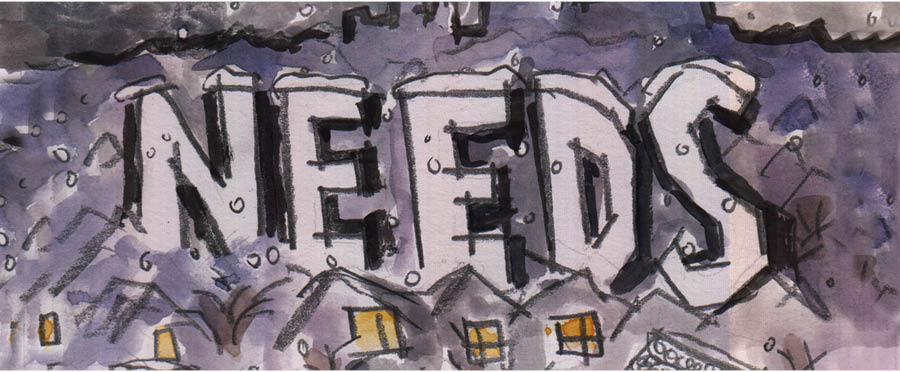Books and the Need for Variety

Through the Loft’s theme of Needs, we’ve been exploring different facets of stories and why we need them. The argument that everyone needs books seems fairly obvious. But it’s also important to remember that everyone’s reading needs are different. People turn to stories for unique reasons, and often need similarly unique solace from them. Thus, problems ensue when someone looks down on another’s reading choices.
I refer to the “hipster-like” attitude applied to books, music, and other art forms when they make their way into the mainstream. But just because something is popular doesn’t mean it’s bad, or inherently worse than something uncommon. The opposite is true as well, of course.
I work at Barnes & Noble on the weekends, because I enjoy being around books and giving recommendations to people looking for something new. Plus, it helps me stay on top of what’s new in the publishing world. Recently, someone (I’ll call her Taylor) who works at a different B&N was complaining to me about the corporate nature of the the B&N chain. Her problem with the store was only the fact that it’s a chain store, as if it was somehow a less valid option for readers, as if shopping there makes you less of a reader.
To be clear, I am all for supporting your local independent bookstore. Do that. Seriously, do that.
But as someone from a small town that doesn’t have its own bookstore, B&N was the best and closest way for me to get what I wanted to read. And that’s the whole point of a bigger chain store like that; it might not be as individualized of an experience, but it will get you what you need. Furthermore, we need bigger chain bookstores like this because they are the main line of defense between the Amazon monopoly and all our favorite independent bookstores. Chain bookstores are huge for the publishing industry, so in that moment of conversation, I resented the literary snobbishness in play.
However, the more frustrating part was that Taylor then started making fun what her customers were buying, how she saw so many customers buying the same books, because of what B&N was promoting at the time. These were books like Michelle Obama’s Becoming, Tara Westover’s Educated, and Delia Owens’s Where the Crawdads Sing. I’ve sold a lot of them too, so I know how popular they are. The thing is, they’re popular because they’re good. They all have received rave reviews and are written by good writers.
Yes, sometimes popular things aren’t well written and sometimes well written things aren’t popular, and the world isn’t fair, but at the end of the day, don’t judge other people for reading! Making fun of strangers for reading something that other people are reading is such a poor way to spend mental energy, and, to reference Mean Girls, it doesn’t make you better than them.
Besides, at the very least, people are still buying books and reading them. They’re still reading! They’re still falling in love with words on a page, and they don’t need to get their reasoning approved by a stranger behind the cash register.
I think this attitude comes from the mistaken assumption that everyone must be after the same type of experience, as if everyone that stops off at McDonalds is in search of an authentic gourmet burger, which is simply not the case. Not everyone wants to read cult classics, obscure titles, or controversial banned books all the time or ever, which doesn’t make them a lesser reader. This leads me to one of my least favorite words: “basic.” The idea seems to be that because someone is reading what’s popular (or listening to, or consuming in any way), they’re doing so blindly without any critical analysis of their own. They’re doing what some marketing team tells them to without any conscious thought.
Obviously, this is not the case with every consumer of pop culture. Not everyone needs to read the same thing based on their lived experience, and it’s elitist to think so. For someone who lives in a smaller town without access to as many bookstore options, reading popular literature can be a way of staying involved in the larger global conversation around books and stories. It’s a way of staying connected to what “everyone else” is talking about. Or maybe popular literature depicts worlds so different from your own that it feels completely new and unique to read about it; it still exposes you to the worldviews and experiences of others.
On the other hand, maybe someone is consuming popular literature, and even culture at large, purely to look at it from a critical perspective of analysis. Regardless, it’s for them to read and explore, not for another to look at from afar and judge.
Let people read what they want to read, while you read what you want to read without any of this bookish, “holier than thou” superiority. (Obviously if your friend starts identifying with fascist propaganda or something similarly problematic, you should address it. Hopefully that doesn’t happen.)
For the most part, throw out the air of superiority and let people read what they want to read.
Originally from Minnesota, Ellen Ray recently graduated from Boston College with a degree in English concentrating in creative writing. Amidst four years of writing workshops and analyzing independent films, she spent a semester wandering around New Zealand, including a night spent in a cave with local penguins. She has written for The Laughing Medusa, an all-female literary journal, as well as various nonprofit organizations. After various internships and an attempt at freelance writing, she found herself the Communications and Marketing intern at The Loft.
